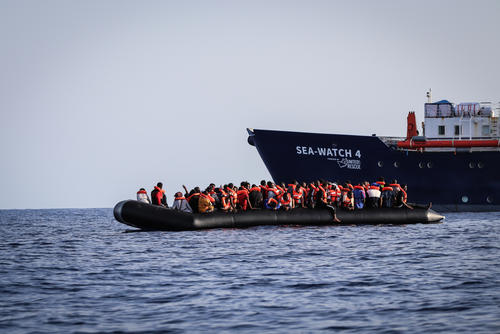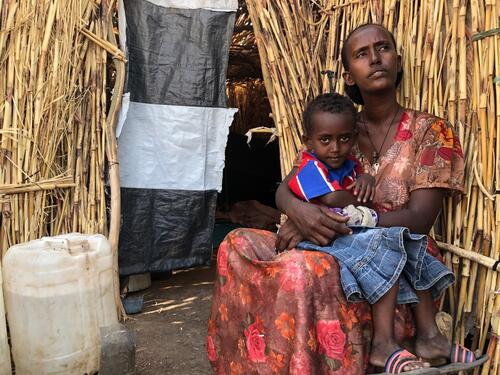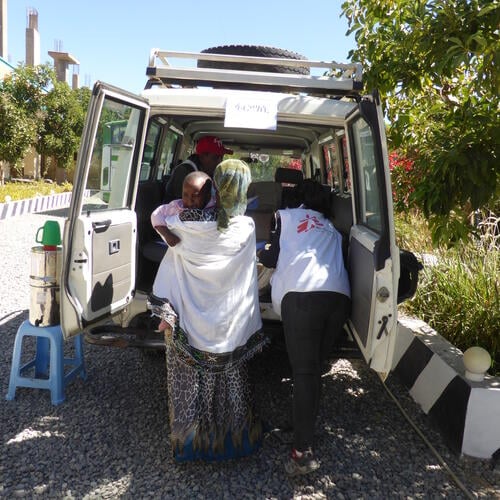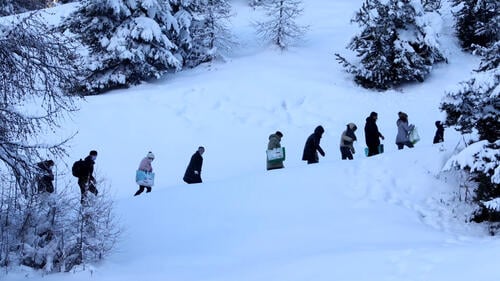Médecins Sans Frontières (MSF), together with Sea-Watch, has been back at sea in the central Mediterranean since 15 August, on board the ship the Sea-Watch 4. Finally, on 1 September, 11 days after the first rescue, the Sea-Watch 4 was allocated a place of safety, in the closest country. The ship is now on route to Palermo, Italy to disembark 353 people.
MSF humanitarian affairs advisor Hassiba Hadj-Sahraoui gives an overview.
What is happening in the central Mediterranean right now?
“The situation at sea is dire. In the short time we’ve been back at sea, we have witnessed how European states are condemning people to drown and blocking actions to save them. Nearly 400 people have died in the central Mediterranean Sea in 2020.<a href= "https://missingmigrants.iom.int/region/mediterranean?migrant_route%5B%5D=1376">Missing Migrants</a> It’s hard to understand how this can be allowed to happen. But it does.
Just two weeks ago, 45 people lost their lives in a shipwreck. Just a few days ago, people crowded onto a rubber dinghy saw four of their group drown. Nearly 400 people have been left stranded awaiting a port of safety, some for days, some for weeks. Twenty-seven of these rescued by a commercial ship, the Etienne, which is an oil tanker, on the orders of Malta, have been left to languish for nearly four weeks. [As of publication, the Etienne is yet to be granted a port of safety, and the 27 people rescued remain on board.]
The situation at sea is dire. In the short time we’ve been back at sea, we have witnessed how European states are condemning people to drown and blocking actions to save them.Hassiba Hadj-Sahraoui, MSF humanitarian affairs advisor
This is the result of deliberate policies to not save lives. In recent months, despite receiving distress calls from rubber boats in their own search and rescue regions, Malta and Italy have been ignoring calls, and delaying rescues, in areas of the Mediterranean Sea that fall under their responsibility. But they are not the only EU states looking the other way.
The failure of states has forced non-governmental organisations (NGO) to try to fill the gap, setting up search and rescue operations. But, thanks to the impounding of ships and unclear administrative blockages, hardly anyone is able to be at sea right now. Currently, only the Sea-Watch 4, and the Banksy-funded Louise Michel, are the only search and rescue vessels active in the central Mediterranean.”
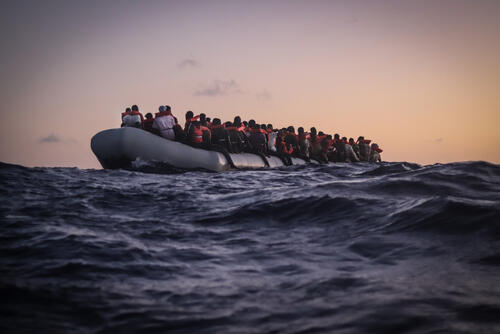
This is the result of deliberate policies to not save lives... despite receiving distress calls from rubber boats in their own search and rescue regions, Malta and Italy have been ignoring calls, and delaying rescues.Hassiba Hadj-Sahraoui, MSF humanitarian affairs advisor
What has been the experience of the Sea-Watch 4?
“MSF has, together with Sea-Watch, been back at sea, on board the Sea-Watch 4 for 11 days now. What we have seen is nothing short of a disgrace. On the evening of Monday 31 August, we were finally notified that we will be able to disembark people in Palermo, Italy – the closest place of safety. Since returning to sea we have been consistently confronted by states, chiefly Malta and Italy, using dirty tactics, ignoring distress calls at sea and passing the buck to others, such as commercial ships or NGO search and rescue ships.
We carried out our first rescue within hours of arriving in international waters, off the coast of Libya, on 22 August. This was followed by two more rescues in the following days. Despite repeated requests for a place of safety, we were not offered one.
Unbelievably, states are now instructing commercial and NGO vessels to assist in rescues, and then refusing to provide a port of safety. Last weekend, (29-30 August) Malta instructed the Sea-Watch 4 to transfer rescued people from the Louise Michel. The Maltese maritime authorities then proceeded to ignore our calls. This comes nearly a month after Malta instructed the Etienne to rescue people; and left them to languish for weeks.”
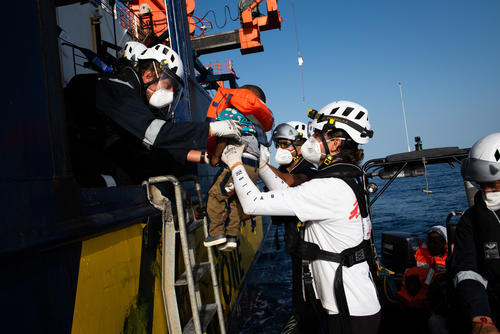
How many rescued people does the Sea-Watch 4 have on board at the moment?
“The Sea-Watch 4 has 353 people on board; 202 from three rescue operations we carried out between 22-24 August, and an additional 152 people we transferred from the Louise Michel. We are particularly concerned about children; we have about 100 unaccompanied minors on board. They are extremely vulnerable and in need of protection.
These states are toying with people’s lives; it is cruel in the extreme.Hassiba Hadj-Sahraoui, MSF humanitarian affairs advisor
Our ship is 60 metres long; with so many people in such a confined space, tensions run high. You can only imagine how difficult the situation is, especially as we try to implement strict COVID-19 protocols on board.
Many people are highly traumatised. People transferred from the Louise Michel had witnessed four people drowning. Only one body was recovered; the others, like so many thousands before, were lost to the waves. And then on top of this is the anguish and anxiety of not knowing what will happen next. These states are toying with people’s lives; it is cruel in the extreme.”
What does the MSF medical team on board the Sea-Watch 4 witness?
“Alongside seasickness and dehydration and scabies, we see chemical burns. This result from a toxic mix of petrol and seawater. One rescued person, a teenager, was so badly burnt that we had to arrange a medical evacuation. Our teams are also treating broken limbs and trauma injuries consistent with reports of abuse and torture and ill-treatment in Libya.
We implement strict COVID-19 protocols, so we are paying particular attention to anyone with possible symptoms, such as a cough or high temperature, and ensuring they are isolated. Both the crew and rescued people are vigilantly washing their hands and wearing face masks.”
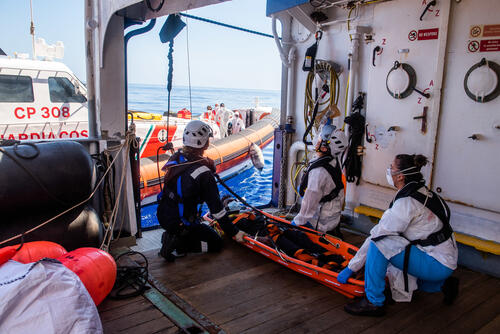
What happened with the Louise Michel?
“On Friday 28 August, the Louise Michel spotted a crowded rubber dinghy – it held 130 people. The people in the unseaworthy boat told the crew of the Louise Michel four of their members had drowned, and the crew were able to recover one body. The Louise Michel, which is only 30 metres long, was already full, with 89 previously rescued people on board.
More than six hours after the dinghy was spotted and no state had responded, the Louise Michel had no choice but to start bringing people on board; providing a life raft when their boat got too full, even to move. On Saturday 29 August, the Louise Michel issued another call for assistance to which the Sea-Watch 4 responded.
Eventually, the Italian authorities assisted by taking 49 of the most vulnerable people: children and some of the women, including those who were heavily pregnant, and people with medical emergencies, to the port of Lampedusa. The Maltese authorities instructed the Sea-Watch 4 to take the remaining 152 people from the Louise Michel on board. Malta, however, did not assign a port of safety to disembark the group, and then ignored repeated requests to provide one.”
Unbelievably, states are now instructing commercial and NGO vessels to assist in rescues, and then refusing to provide a port of safety.Hassiba Hadj-Sahraoui, MSF humanitarian affairs advisor
How did the Sea-Watch 4 ask for port of safety?
“A rescue can only be considered complete when rescued people are disembarked in a place of safety. On Sunday 23 August, we wrote to the Maltese and the Italian authorities to request one. We copied in Germany, the flag country of the Sea-Watch 4.
The Maltese authorities have consistently ignored us or responded to us negatively. Italy was slow to respond but on Friday 28 August, the Italian authorities asked us for more information – such as whether there were family groups, unaccompanied minors, and urgent medical cases. This gave us a sense that discussions were moving in the right direction, but we had absolutely no certainty about when and how we would be able to disembark rescued people. We all had the situation of the Etienne, which had been at sea for weeks, at the forefront of our minds.”
Why is it Italy and Malta who have to respond the most?
“All EU states share responsibility. Those looking the other way are also failing to assist Italy and Malta, who are at the forefront. Italy, for example, has been left virtually all alone in responding to the hundreds of migrants, refugees and asylum seekers who have arrived by themselves in the port of Lampedusa in recent months.
When it comes to port of safety, it should be the closest safe place where the authorities would then assess the people’s needs for protection. That was why, despite the generous offer from the port of Marseille, we could not travel over many days to disembark people there. What France, and other European states, can do is to reach out to Italy to offer to relocate some of the rescued people.”
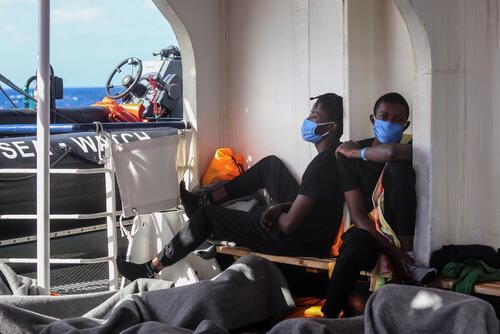
What do you think will happen next, what about COVID-19?
“As a medical, humanitarian organisation, MSF is particularly aware of the risks posed by COVID-19. We have responded or are responding to the COVID-19 pandemic in more than 70 countries, including in Italy. We very much support the need to take all necessary precautions. That's why on board we implement some very strict COVID-19 protocols. And we believe if we are asked to quarantine people we bring to a port of safety, as long as basic conditions are met, this is an acceptable measure.
What we will not accept is if the ship is impounded for no good reason, or on trumped up excuses, as we have seen happen in the recent past. We may be told for example, that we have too many people on board despite this being the case because we followed orders from state maritime authorities.”
Every European state has a role to play; to offer concrete solutions to share the responsibility and establish an appropriate search and rescue mechanism at sea.Hassiba Hadj-Sahraoui, MSF humanitarian affairs advisor
Why does MSF insist on bringing people to Europe? Why can't they be taken back to Libya?
“The short answer? It would be unlawful to take people back to Libya. Why? Because Libya is absolutely not a place of safety, and returning people to Libya, is a breach of international law – this fact has been reiterated by the UN High Commissioner for Refugees (UNHCR) and the International Organization for Migration (IOM).
MSF runs projects in Tripoli, Misrata, Zintan and Beni Walid. In these places, we see the direct impacts of the abuse migrants, refugees and asylum seekers endure not only in detention, but also in the hands of traffickers. This includes torture and other ill-treatment, forced labour, and extortion.
A recent major shipwreck off the Libyan coast, took at least 45 lives. Our teams met some of the survivors, after they were taken back to Libya. Their stories were harrowing.”
These cruel stand-offs at sea must end. No ifs, no buts. No tossing the ball between states.Hassiba Hadj-Sahraoui, MSF humanitarian affairs advisor
Who should take responsibility here?
“What is striking is how we once again witness a human-made disaster, a policy-induced one. European states must take responsibility. Italy and Malta are failing to meet legal obligations to rescue people or to allocate a port of safety and appropriate assistance.
But, let’s also be very clear, the responsibility for this does not rest upon these two countries alone. Every European state has a role to play; to offer concrete solutions to share the responsibility and establish an appropriate search and rescue mechanism at sea. In addition to the rescues carried out by the Sea-Watch 4 and the Louise Michel (as well as the Etienne of course), a number of people are managing to arrive by themselves at Lampedusa, and other landing spots in the south of Italy.
European states are toying with the lives of people. The moral and legal imperative to save lives must prevail. European states must deploy adequate search and rescue capacity at sea and respond to distress calls. These cruel stand-offs at sea must end. No ifs, no buts. No tossing the ball between states. This is entirely possible with state led search and rescue capacity and cooperation for a predictable and sustainable mechanism to disembark rescued people in the nearest place of safety.”



